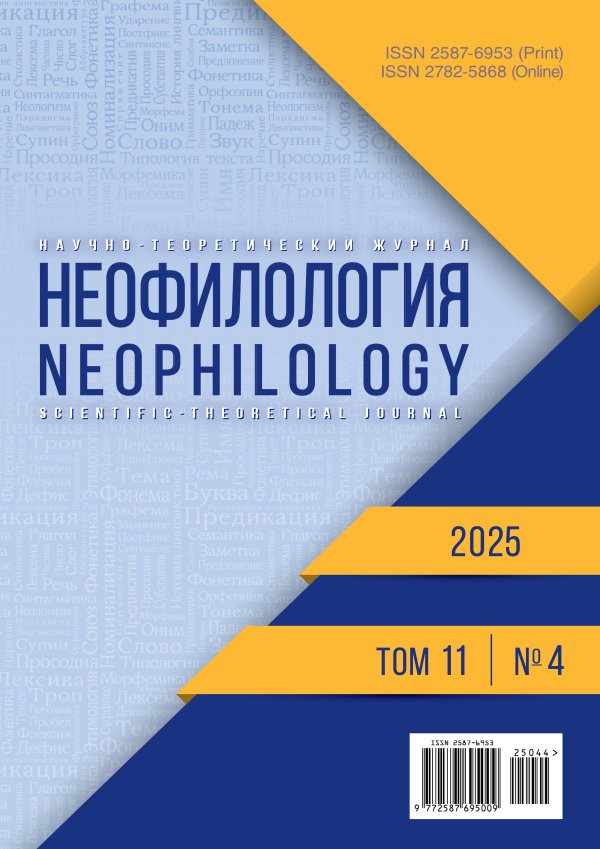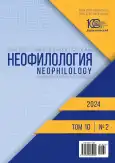Образ города Самарканда в художественной картине мира исторического романа А. Якубова «Сокровища Улугбека»
- Авторы: Исматова Н.А.1
-
Учреждения:
- Самаркандский государственный университет имени Ш.Рашидова
- Выпуск: Том 10, № 2 (2024)
- Страницы: 434-441
- Раздел: РУССКАЯ ЛИТЕРАТУРА И ЛИТЕРАТУРЫ НАРОДОВ РОССИЙСКОЙ ФЕДЕРАЦИИ
- URL: https://journal-vniispk.ru/2587-6953/article/view/295605
- DOI: https://doi.org/10.20310/2587-6953-2024-10-2-434-441
- ID: 295605
Цитировать
Полный текст
Аннотация
ВВЕДЕНИЕ. Целью исследования является изучение городского текста в отражении художественной картины мира исторического романа Адыла Якубова «Сокровища Улугбека», позволяющее рассмотреть произведение на основе анализа места и действия событий. МАТЕРИАЛЫ И МЕТОДЫ. Материалом исследования послужил исторический роман А. Якубова «Сокровища Улугбека». Использованы описательный метод, хронотопический, мотивный и геопоэтический подходы. РЕЗУЛЬТАТЫ ИССЛЕДОВАНИЯ. Установлено, что историческое бытие города Самарканда в художественном произведении определило поведение героев: образ города выступает второстепенным действующим лицом, становится непосредственным участником культурно-исторических событий. ЗАКЛЮЧЕНИЕ. Анализ художественной картины мира исторического романа А. Якубова «Сокровища Улугбека» показал, что атмосфера жизни и быта жителей Самарканда XV века включает в себя культурно-исторический, хронологический, эстетический аспекты, с помощью которых воссоздаётся непосредственная связь в изображении человека и его чувств и окружающей его действительности. Доказано, что топоним Самарканд – это своеобразный художественный хронотип, позволяющий представить единство национальной региональной культуры, осуществить через прошлое понимание исторической городской реальности и утвердить положение о том, что образ города Самарканда являет собой базис художественного мышления автора романа А. Якубова.
Об авторах
Н. А. Исматова
Самаркандский государственный университет имени Ш.Рашидова
Автор, ответственный за переписку.
Email: nice.natali2017@mail.ru
ORCID iD: 0000-0002-1064-4542
преподаватель кафедры русской и зарубежной литературы
140104, Республика Узбекистан, г. Самарканд, Университетский б-р, 15Список литературы
- Липатова Е.В. Репрезентация самаркандского текста в лингвокогнитивном аспекте // Неофилология. 2024. Т. 10. № 1. С. 67-75. https://doi.org/10.20310/2587-6953-2024-10-1-67-75, https://elibrary.ru/vryrio
- Хазанкович Ю.Г. Время-пространство в прозе малочисленных народов Севера // Studia Litterarum. 2017. Т. 2. № 2. С. 230-243. https://doi.org/10.22455/2500-4247-2017-2-2-230-243, https://elibrary.ru/ysqzbf
- Бурлина Е.Я. «Что ни город, то хронотип». Пространственно-временная диагностика города // Международный научно-исследовательский журнал. 2017. № 9-1 (63). С. 103-108. https://doi.org/10.23670/IRJ.2017.63.035, https://elibrary.ru/zgsemj
- Литвин Е.Ю. Методика когнитивного анализа художественного текста // Когнитивные исследования языка. 2017. № 30. С. 584-587. https://elibrary.ru/zmqimv
- Щербак А.С. Перифраза «татарский мурза» и антропоним Державин // Имя в пространстве культуры: коллективная монография к 80-летию профессора Г .Ф. Ковалёва / под общ. ред. С.А. Скуридиной, С.А. Попова. Воронеж: АО «Воронежская областная типография», 2023. С. 331-338. https://elibrary.ru/tkvsnx
- Щербак А.С. Мышление – ономастический знак – действительность // Когнитивные исследования языка. Когниция, коммуникация, дискурс: современные аспекты исследования: материалы Всерос. науч. конф. с междунар. участием. Тамбов: Изд. дом «Державинский», 2023. № 3-2 (54). С. 272-276. https://elibrary.ru/logqlm
- Анциферов Н.П. «Непостижимый город…». СПб.: Лениздат, 1991. 333 с. https://elibrary.ru/vtepmn
- Селеменова М.В. «Московский текст» в русской литературе XX в. (на материале художественной прозы 1910–1950-х гг.) // Вестник Российского университета дружбы народов. Серия: Литературоведение. Журналистика. 2009. № 2. С. 27-34. https://elibrary.ru/kohrfv
- Топоров В.Н. Петербургский текст русской литературы. СПб: Искусство–СПБ, 2003. 616 с. https://elibrary.ru/vnjoij
- Авазова А.К., Сабиров М.Р. Астрономия в творчестве А. Якубова (по роману «Сокровища Улугбека») // Молодой учёный. 2021. № 26 (368). С. 333-335. https://elibrary.ru/luxdcm
- Миллер Л.В. Художественная картина мира и мир художественных текстов. СПб.: Изд-во Филол. факта С.-Петерб. гос. ун-та, 2003. 154 с.
- Чиркова Н.В. Образ города в контексте репрезентации исторической и культурной памяти: наследие и современность// Вестник Челябинского государственного университета. 2023. № 4 (474). С. 119-123. https://doi.org/10.47475/1994-2796-2023-474-4-119-123, https://elibrary.ru/lcaflw
- Картавенко В. Семантика топонима как концентрированного текста // W kręgu zagadnień semantyki i stylistyki tekstu. Łódź: Wydawnictwo Uniwersytetu Łódzkiego, 2014. S. 55-64. https://doi.org/10.18778/7969-416-7.06
- Песина С.А., Волкова В.Б., Малеко Е.В. Особенности генезиса топонимов в поликультурном пространстве Южного Урала // Вопросы когнитивной лингвистики. 2023. № 4. С. 99-107. https://doi.org/10.20916/1812-3228-2023-4-99-107, https://elibrary.ru/gkamsc
- Малыгина Ю.В. Образ города в языке русской классической литературы // Челябинский гуманитарий. 2016. № 1 (34). С. 30-33. https://elibrary.ru/vzdgib
Дополнительные файлы











